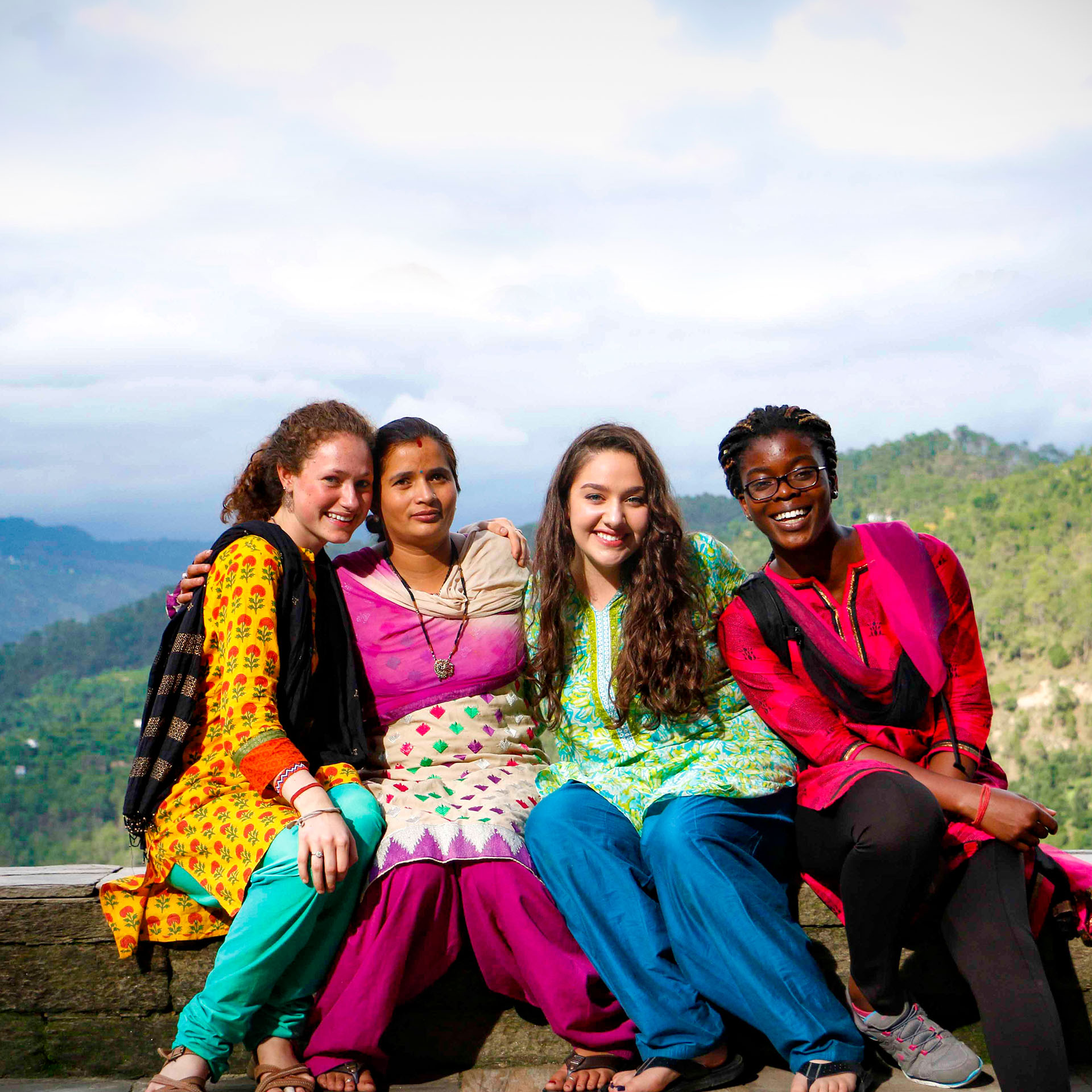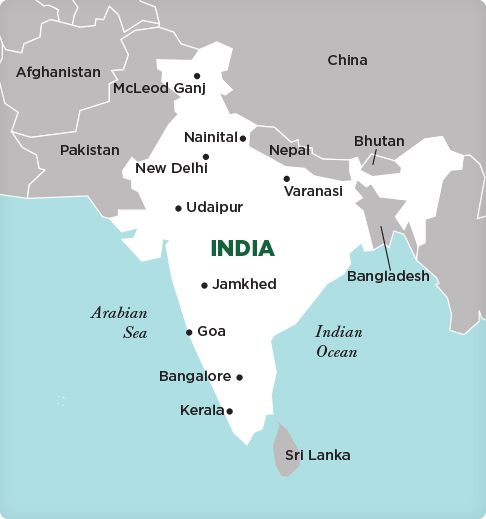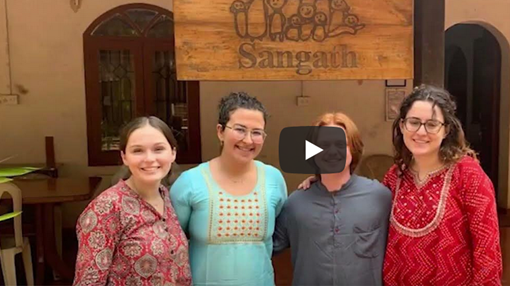Credits
16
Prerequisites
None
Language of Study
Hindi
Courses taught in
English
Dates
Aug 28 – Dec 10
Program Countries
India
Program Base
New Delhi
Critical Global Issue of Study
Global Health & Well-being
Development & Inequality

Understand how and why India's approaches to health, gender, sexuality, and identity are changing.
16
None
Hindi
English
Aug 28 – Dec 10
India
New Delhi
Global Health & Well-being
Development & Inequality
India has a long and complex history of interventions in reproductive health. Globalization, neoliberalism, and rapid societal changes are changing how India’s public health institutions approach the reproductive health of sexual minorities.
This program offers an opportunity to understand the place of women and sexual minorities in reproductive and sexual health settings. You will have access to SIT’s longstanding network of institutions and public health officials engaged in healthcare delivery and policy-making at national and international levels. In person classroom sessions facilitated by health strategists, experts, and activists, coupled with field and institutional visits, will enable you to learn how reproductive epidemiology informs healthcare delivery for women and sexual minorities in rural and urban contexts. In rural communities, you will conduct fieldwork and engage with community-based organizations and advocacy groups for a deeper dive into grassroots approaches to healthcare access. Through classroom teaching and immersive field study, you will gain knowledge and insights into innovations for inclusive and accessible reproductive and sexual health care in one of the most populated democracies in the world.
None


A week-long excursion in the Himalayas will orient you to the primary healthcare system in rural India. Observe the delivery of reproductive and sexual healthcare services at the primary, secondary, and tertiary levels through village and community health centers and district government hospitals. Meet doctors, paramedics, patients, health workers and volunteers, trained birth attendants, mobile health teams, and girls’ and women’s groups from villages in Nainital district of Uttarakhand.
A week-long excursion in Goa will focus on the work of community-based organizations that use science with a humanitarian approach to address the physical and psycho-social well-being of women, children, adolescents, and LGBTQIA+ persons. Students will interact with activists, mental health practitioners and scholars, legal experts, and survivors to get a 360-degree view of mental health issues, factors perpetuating domestic violence or child abuse, initiatives for prevention and treatment, and processes of rehabilitation.
Engage in a series of issues-oriented workshops at a variety of host sites. Workshops are designed as case studies around specific topics, problems, and solutions that arise from discussions with host organizers. You will study at the world-renowned Comprehensive Rural Health Project (CRHP) in Jamkhed, one of the most effective community health projects in India.
CRHP has worked among the rural poor in the western state of Maharashtra for more than 54 years. By partnering with village communities and building on local knowledge and resources, the project has utilized community-based epidemiological knowledge to meet the immediate- and long-term reproductive and sexual health needs of men, women, and adolescents in marginalized rural populations, regardless of caste and religion.
Travel to the southern state of Kerala to learn from its oldest feminist LGBTIA+ support group, Sahayatrika. In this setting, you will learn about the impact of 20 years of crisis intervention, support, advocacy and campaign work on societal perceptions of queerness and shifts in inclusion and visibility of queer persons in Malayali society.
You will engage with a range of LGBTQIA+ activists and allies in cities of Trichur and Kochi to understand the physical and mental health needs of queer persons, their social determinants, and the public health responses to these needs. You will interact with public health experts and medical practitioners to develop a critical evaluation of the health establishment’s ability to deliver efficacious and respectful healthcare to LGBTQIA+ persons in a state lauded for its achievements in human development.
Seva Mandir has worked in community development for more than 50 years among the most vulnerable populations in the tribal blocks of Udaipur. In this workshop, you will engage with health functionaries and visit resource centers for women and youth to understand grassroots approaches to violence against women, a known predictor of poor sexual and reproductive health outcomes.
Learn from trainers and youth groups about preventive tools and rehabilitative interventions, the gendered nature of domestic violence and accusations of witchcraft against women, and about sexual and reproductive rights. Meet traditional healers, visit herbal gardens, and gain an understanding of Indigenous herbal medicine in pregnancy, childbirth, and post-natal care with Jagran Jan Vikas Samiti, which works in integrated rural development, promotion of traditional health systems, and advocacy.
Surrounded by the beautiful Dhauladhar range of the Himalayas, participate in a workshop at Kayakalp, an organization that aims to provide complete healthcare by treating body, mind, and soul. Take introductory classes followed by a demonstration of the traditional Indian practices of Ayurveda, yoga, and meditation therapies. In addition, travel to McLeod Ganj, home to His Holiness the Dalai Lama and a Tibetan community in exile.
Please note that SIT will make every effort to maintain its programs as described. To respond to emergent situations, however, SIT may have to change or cancel programs.
Upon successful completion of the program, students will be able to:
The following syllabi are representative of this program. Because courses develop and change over time to take advantage of dynamic learning opportunities, actual course content will vary from term to term.
The syllabi can be useful for students, faculty, and study abroad offices in assessing credit transfer. Read more about credit transfer.
Reproductive Epidemiology – syllabus
(IPBH3000 / 3 credits)
This seminar explores reproductive epidemiology and its application with specific reference to the context of India. Students will first be introduced to basic principles and methods to understand the distribution and determinants of disease and other health-related states. These epidemiological tools and assessment measures provide a scientific basis to design preventive, curative, and rehabilitative programs for rational interventions, using available resources to efficiently and effectively check disease and mortality, reduce suffering due to illness and its impacts, and enhance the quality of life of social groups and communities.
Through a combination of classroom teaching, field excursions, and workshops, the seminar will orient students to a critical appreciation of the epidemiological rationale underpinning the life course approach to reproductive and sexual health in the public health service system in India.
Sexual Minorities and the Right to Healthcare – syllabus
(IPBH3500 / 3 credits)
This seminar examines the dynamics of provision and access to reproductive and sexual healthcare services among women and sexual minorities in the Indian healthcare systems through a rights-based approach. Through site visits and panel discussions with representatives from communities of sexual minorities, students will gain an understanding of the spectrum of identities evolving outside the dominant paradigm of heterosexual marriage; their lived experience within families, queer relationships and collectives, and emerging health needs. The seminar will identify the range of physical and mental health needs of straight, gay/lesbian, gender queer, hijra, and trans persons across caste and class. The seminar will also evaluate the trajectories of policy and programmatic responses by the public healthcare services and present an overview of civil society responses.
Beginning Hindi – syllabus
(HIND1003-1503 / 3 credits)
Intermediate Hindi – syllabus
(HIND2003-2503 / 3 credits)
Advanced Hindi – syllabus
(HIND3003-3503 / 3 credits)
Based on an in-country evaluation that includes oral proficiency testing, students are placed in beginning, intermediate, or advanced classes. The emphasis is on speaking and comprehension skills through classroom and field instruction. Students acquire a solid foundation in standard Hindi to enable interaction with speakers of Hindi in north India and all over the world. Students will be expected to make rapid progress in both speaking and listening comprehension by using Hindi outside of class as much as possible, particularly with family members in their homestays. Although we expect that dedicated students will acquire a strong, functional ability to communicate in Hindi, students wishing to interact substantively with Hindi speakers should expect extensive collaboration with a translator for their Independent Study Project or internship.
Field Methods and Ethics – syllabus
(ANTH3500 / 3 credits)
Concepts and skills introduced in Field Methods and Ethics unite and reinforce all program components. They are put to the test through the execution and successful completion of an Independent Study Project or internship at the end of the semester. Students learn about cross-cultural adaptation; build skills in project selection and refinement; choose appropriate methodologies; and apply ethical principles in field studies in observance of the SIT Human Subjects Review Policy. Students practice developing contacts and finding resources; honing skills of observation and interviewing; gathering, organizing, and communicating data; and maintaining a work journal.
The Field Methods and Ethics course helps students understand the methods, rationale, and considerations underpinning the selection of question-appropriate health indicators. Students learn the sociological and policy importance of gathering data on reproductive and sexual health and rights-based healthcare, and their value in creating a better society.
Independent Study Project – syllabus
(ISPR3000 / 4 credits)
Conducted in north India or in another approved location. Sample topic areas: international, national, and regional responses to epidemics and pandemics, especially for women and sexual minorities; role of gender in health equity and disability; major challenges for women and sexual minorities to accessing sexual and reproductive transmitted diseases-related services; target healthcare intervention for women and LGBTQIA+ communities; impact of globalization on healthcare delivery to marginalized communities; healthcare services planning and management; privatization of health services and health tourism in low-middle income countries. The Independent Study Project culminates in a research paper and presentation.
Sample ISP topic areas:
Internship and Seminar – syllabus
(ITRN3000 / 4 credits)
This seminar consists of a four-week internship with a local community or research organization, business, or international NGO in India. The aim of the internship is to enable students to gain valuable work experience and enhance their skills in an international work environment. Specifically, students will conduct an internship in the context of reproductive and sexual health, gender and sexuality issues in India. The focus will be on linking internship learning with the program’s critical global issues. The seminar includes regular reflection and assessment meetings with the academic director or internship coordinator to review the progress of the internship and learning associated with the internship experience. Students complete a substantial academic paper in which they process their learning experience on the job, analyze an issue important to the organization, and/or design a socially responsible solution to a problem identified by the organization. Students also conduct an oral presentation of their internship experience and findings.
Sample Internships:


A diversity of students representing different colleges, universities, and majors study abroad on this program. Many of them have gone on to do amazing things that connect back to their experience abroad with SIT. Recent positions held by alumni of this program include:
Epidemiologist, Centers for Disease Control, Atlanta
Technical Officer, World Health Organization
Co-founder, Broad Street Maps, Seattle, Washington
Fulbright Nehru Fellow researching the rehabilitation of drug-addicted youth in India
Boren Fellow studying Hindi and conducting independent research on sanitation, infection, and nutrition, India
Medical and public health master’s degree students at Yale University and Johns Hopkins University


SIT Study Abroad is committed to ensuring that international education is within reach for all students. We believe in the transformative power of immersive, intercultural experiences and are dedicated to supporting students in their educational journey.
See Full Breakdown
A critical step in preparing for your study abroad program is planning how you will maintain your health and wellbeing. Please review the following information carefully and contact [email protected] with any questions or concerns.
View Information
Students on India: Public Health talk about research, excursions, great food and more!
SIT Study Abroad India: Public Health, Gender, and Sexuality
@indiapublichealthsitstudyabroad
Spring 2013 alumna Julika Kaplan’s ISP paper has been included in the book, Nudging Health: Health Law and Behavioral Economics, published by the Johns Hopkins University Press.
Students in SIT Study Abroad program India: Public Health, Gender, and Sexuality often do in-depth health research.